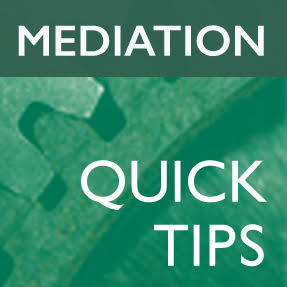
Welcome to this ‘Mediation Quick Tips’ Newsletter Issue 24
Safe Challenging Questions – Managing Negativity
When a party uses negative language, it can unsettle the other party and potentially reverse the progress made in mediation. What can a mediator do to reframe this negativity in a more constructive way?
NOTE!
The 2nd Edition of ‘The Mediator’s Toolkit: Formulating and Asking Questions for Successful Outcomes’, published 10th June 2025 can be ordered on amazon.com or waterstones.com or on amazon.co.uk and other well known websites.
Next O’Sullivan Solutions online advanced mediation courses:
October 9, 10, 16, 17 – 2025
February 5, 6, 12, 13 – 2026
Time Schedule for all advanced mediation courses:
Irish Standard Time: / GMT: 1.30pm -5.30pm
Four half days – Live zoom course
advanced level mediator training
1. Avoid reflecting back strong negative adjectives
Avoid reflecting back strongly negative adjectives that one party may use about the other party and either ask for specific examples or ask about the impact, or focus on the feelings of the party using the negative adjective
Instead of repeating a strong negative adjective used by a party, either ask for specific examples or ask about the impact, or focus on the feelings of the party using the negative adjective.
Example:
John says:
‘She might have been good at the start, but now she is useless at managing the project’s budget!’
Mediator’s reframe before asking a question:
‘John, it sounds like you are saying that Karen was good at the start and you are concerned at the way in which she manages the budget.’
‘Can you be a little more specific about your concerns?’
or
‘John, it sounds like you are saying that Karen was good at the start and you are now concerned at the way in which she manages the budget. How is this impacting you?’
or
‘John, it sounds like you are saying that Karen was good at the start and you are concerned at the way in which she manages the budget, what might be the future implications?’
2. Move from a Past and Negative Narrative to a Future and Positive Narrative
The focus and thinking of parties in mediation is influenced and driven by the kind of questions they are asked. The quality and strategic focus of the question will influence the connections generated in the brain, and this will affect the quality of their thinking and, ultimately, the quality of their responses.
Example:
If you ask a question that is problem focused, you may get responses about the problem accompanied by negative emotions regarding the past. Any follow-up question needs to focus on opportunities and possibilities for the future, if you are past the stage of exploring underlying interests.
Example:
Party says:
‘She should stop behaving like that!’ (Former narrative)
Mediator’s reframe:
‘How would you like Karen to be from now on?’ (Moving to a new narrative)
Example:
Party says: ‘
It would never work.’ (Former narrative)
Mediator asks:
‘What would it be like if it did work?’ (Moving to a new narrative)
‘If it did work, what would have happened that would have resulted in it working?’ (Moving to a new narrative)
Hazard Warning
Moving parties from a past narrative to a future narrative should only be done after parties have had an opportunity to express their emotions.
Note:
Asking ‘Future Focus‘ questions is another way to move parties out of a negative spiral and these are covered in Chapter 17 of ‘The Mediator’s Toolkit: Formulating and Asking Questions for Successful Outcomes‘ and are also covered in the online training based on The S Questions Model developed in the book.
Next Newsletter
How do you cope with toxic language that invites defensiveness from a party who hears it? The skills is to reframe the message in a way that acknowledges the truth, while minimizing blame and fostering understanding.
NOTE!
The 2nd Edition of ‘The Mediator’s Toolkit: Formulating and Asking Questions for Successful Outcomes’, published 10th June 2025 can be ordered on amazon.com or waterstones.com or on amazon.co.uk and other well known websites.
Next O’Sullivan Solutions online advanced mediation courses:
October 9, 10, 16, 17 – 2025
February 5, 6, 12, 13 – 2026
Time Schedule for all advanced mediation courses:
Irish Standard Time: / GMT: 1.30pm -5.30pm
Four half days – Live zoom course
advanced level mediator training



